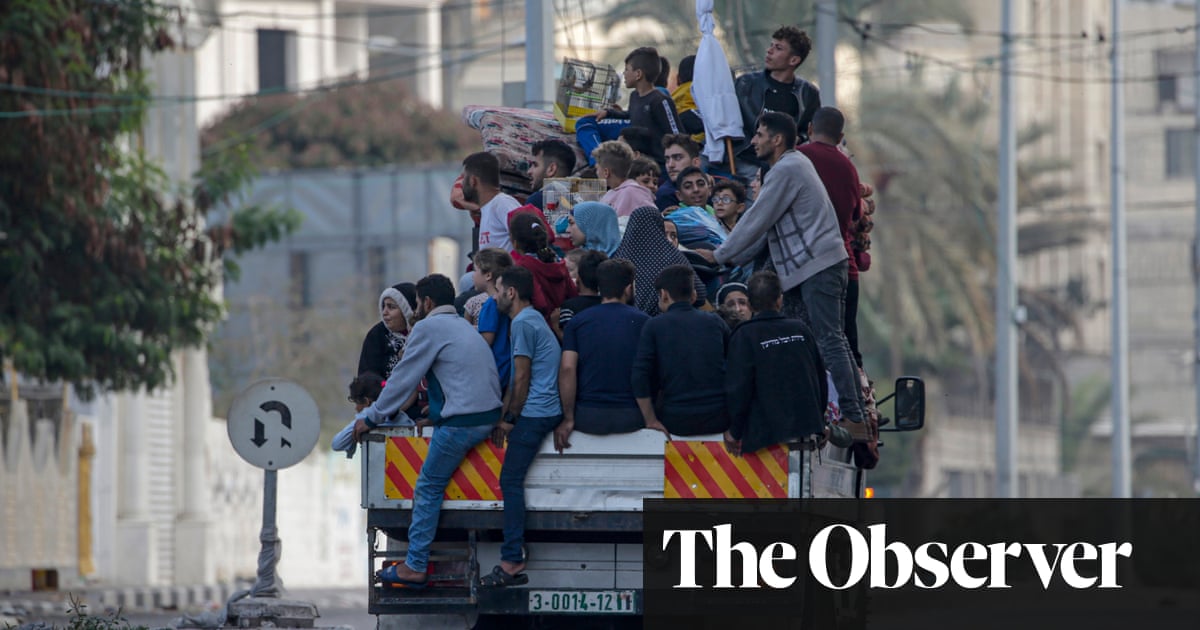
was at work on Thursday morning when I got the call from a friend over in Pollokshields, on the south side of Glasgow: “It’s the Home Office, they’re trying to detain asylum seekers. Get down here.”
When we got to Kenmure Street there was, thanks to the No Evictions Network, already a crowd surrounding the Immigration Enforcement van. One brave man had managed to get underneath, and was huddled there in the cold, squashed between the tarmac and the vehicle’s underside.
The crowd chanted: “No one is illegal!”, and some held placards saying: “Refugees welcome here”. As I waded through, it seemed like everyone was calling a friend: “Get down here, we need more people.” The community was organising to protect its own.
Someone handed me the megaphone, and I repeated what I had already heard so many people in the crowd telling one another, “You’re doing great! We can win this!” And I knew it was true: 16 years ago, me and my friends had also fought, and won.
In 2005, our friend Agnesa and her family had been detained by the Home Office. Nessa’s family were asylum applicants, just like me. And in the middle of the night, 12 immigration officials broke down their door, forcefully put them in a van with few belongings, and drove them to Yarl’s Wood to be deported.
We were desperate for her – but also for ourselves. We watched the door, knowing that we could be next. My grandfather and uncles had been executed back in Iraq, and here in Scotland the community accepted us with open arms – but the Home Office didn’t. They made our lives hell. They put obstacles in the way of my education, they stopped us travelling or working. And now they were dragging us from our homes in the middle of the night and throwing us into, effectively, a prison.
We didn’t know what to do, so we fought back. We went on school strike, started a petition, got in the paper, and ended up meeting the first minister and forcing him to change asylum detention policy in Scotland. They called us the Glasgow Girls.
That year our community stopped so many dawn raids, and we did it through organising. Our neighbours in our block would call people: “Go downstairs, Immigration are coming.” We’d jump out of bed, run straight out, and surround the van or block the Home Office officials from getting in. Often we wouldn’t know who they were there to detain – one time the man they were trying to detain was actually down there with us in the protest.
And now, in 2021, it was happening all over again. I went over to a police community liaison officer, telling him the men inside the van must be hungry and had no access to a toilet: surely on health and safety grounds the police should tell Immigration Enforcement to let the detained men go? Many of us had tweeted at the first minister and the Scottish justice secretary, urging them to lend their support to the negotiations with the police to try to get the asylum seekers released.
Under heavy grey clouds, more and more police arrived to surround the van, but the crowd of protesters grew bigger and bigger, louder and louder. Someone called out over the megaphone: “Whose city?” And hundreds of members of the community replied, chanting: “Our city!” There was so much anger – at anyone being detained, but especially during the holy month of Ramadan – but we stayed positive.
At about 5pm, the police gave in, announcing they would release the detainees. As the men climbed out of the back doors of the van, the biggest roar you can imagine rose from the crowd. I was so overwhelmed. I was back in 2005, at the wee party we held when Nessa got out of Yarl’s Wood.
That was when I had really learned that if we resist, we can win. And anyone can do this. Contact your local refugee support charity or campaign group and get involved, or even set up your own group in your own community. And if you see Immigration Enforcement vans on the streets, please, please don’t just walk by. Take a photo and tweet it to the Anti-raids network and the No Evictions campaign.
This kind of action needs to happen on the streets and in our halls of power. Personally, I’m campaigning for Scottish independence, but in the meantime, immigration issues must be devolved to the Scottish parliament. Our nation needs a fair and humane system, so that the world looks to Scotland as a model. Case workers should be able to meet the asylum claimants whom they work with, there should be no raids and no detention centres. In education, which is devolved, Scotland has achieved so much: there have been successful campaigns for some asylum seekers to access higher education through scholarships. And Scotland is the only nation of the UK that allows refugees the right to vote in devolved and council elections. We want to be able to push forward the same kind of change in immigration rules too.
Glasgow has a proud history of activists defying the authorities and changing our society for the better, from the striking Calton weavers to the rent strikes led by women during the first world war. I’m proud that the Glasgow Girls are a wee part of that history, and now Kenmure Street is too.
Those victories can happen again. Like the crowd said: Take your vans back to London. You don’t mess with Glasgow.
Roza Salih is a Kurdish-born human rights activist based in Glasgow. At the age of 15, she co-founded the Glasgow Girls with fellow pupils from Drumchapel high school, and prevented the deportation of their friend.












